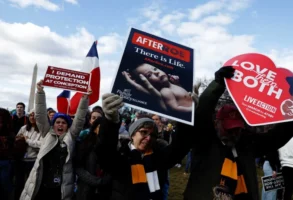
Published July 20, 2022
One of our summer interns, Jack Wolfsohn, noted in a great post yesterday that Merriam-Webster has added a second definition of the word “woman,” with the descriptor “having a gender identity that is the opposite of male.”
Jack did a good job exposing this for the lunacy that it is, and in his conclusion he pointed to a further idea on which I want to elaborate: the question of why this sort of lunacy has become so common so quickly. There is an objective reality to what it means to be embodied as a human being. We all know which bodily characteristics indicate maleness or femaleness; these are realities that go all the way down to each cell in our body, indeed, to our very chromosomes. Some of the ways in which we live as men and women might change across cultures, but the fact of being either a man or a woman doesn’t. Embodied sex is not a social construct or a manufactured structure of oppression.
The objective certainty of the body is precisely why the Left is fighting this particular culture war on the grounds of language, radical redefinition of terms, and, ultimately, censorship. They can’t alter reality, try as they might, so instead they have turned to flexing their power — which explains why we’re witnessing a dictionary attempt to redefine reality with just a few clicks.
Through sheer intimidation, and by controlling the right institutions, they have managed to begin overhauling the very way we speak, enforcing that overhaul by punishing and silencing nonconformists. It is a risky business to say on social media that men can’t get pregnant. Teachers and students across the country are being forced to use the preferred pronouns and names of those who identify as the opposite sex. When you can’t control reality, all you can do is attempt to control the way we speak about it.
EPPC Visiting Fellow Alexandra DeSanctis writes on abortion policy and the pro-life movement, as well as on other key topics at the intersection of politics, culture, and religion.
Photo by Joshua Hoehne on Unsplash
EPPC Fellow Alexandra DeSanctis writes on culture and family issues, with a particular focus on abortion policy and pro-life advocacy, as a member of the Life and Family Initiative.








